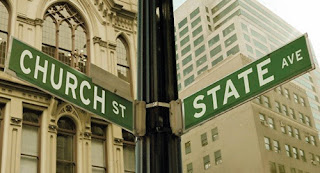Should the state privilege one religion?
What is the role of the state?
Let's set up the elements of the decor: crucifixes are hung in the classrooms and the Council of State has an official place in the Corpus Christi procession. Businesses are subject to church tax, and all taxpayers contribute to the financing, through ordinary taxes, of the Roman Catholic Faculty of Theology.
Does the State consider agnostics and those who are indifferent to religion to be lost sheep that it should, if possible, bring back into the right flock? When Christians proclaim their hope that the coming century will become religious again, do they hope to revive indoctrination? Just as there is a reason of state, can we invoke a reason of Church that prevails over respect for people? Do we live in a crypto-confessional state, i.e. non-confessional in its statements and appearance, but confessional in its interior and functioning? Do supporters of a residual clericalism give their support to Muslims who, in their respective countries, demand that the state be religious?
On the contrary, I believe that the State, not being the arbiter of religious truth, must welcome all citizens in the same way, without making differences, whether they are Christians, Muslims, Buddhists, without religion or others. Consequently, it cannot take sides with particular communities, for example by proclaiming itself Christian or declaring that certain religions are entitled to a privileged status.
In order to maintain their political majority, will supporters of residual clericalism ally themselves with certain religious minorities? Will Pentecostals? Muslims? Buddhists? Scientologists? Raelians be given official status? In Great Britain and Greece, the recognition of religious communities has swollen to the point of giving legal status to Islamic courts.
In my opinion, the state should not support certain religious communities. In order to promote civil peace, the state should mitigate the division of society into religious communities through a restrictive policy of favours. It must demonstrate, including in public education, its neutrality with regard to beliefs.
Religion cannot be indicated on identity cards because of the risk of discrimination. Similarly, it should not appear on any administrative documents, including those relating to taxes. For example, the Constitution of Spain, in its Article 16.2, states
No one may be forced to declare his or her ideology, religion or beliefs.
In the canton of Fribourg, the state collects and registers the lists of Catholics, Protestants and Jews! I am astonished not to hear those who want the state to do less, protesting against the recording of this sensitive data. The heading "religion" must disappear from the Fribourg tax declaration.
"Do not mix politics and religion" being a universal recommendation, Westerners cannot only address it to Muslim countries. Church and State must be completely separated throughout Switzerland, following the example of the cantons of Geneva and Neuchâtel. I refuse to allow part of my taxes to be used to support Vatican propaganda.
It is accepted that the school is not politically engaged. The same should be true in religious matters. Instead of focusing on shaping the minds of students by encouraging the dissemination of myths and fables that do not hold water, the Directorate of Public Education would do better to develop the ability to step back and learn critical thinking. Some rudiments of epistemology would highlight the distinction between ideology and objective knowledge. One could become aware that universal truth does not exist and, for example, compare various religions and ideologies from the point of view of respect for human rights. The status of women may be the result of a power struggle in which religion has been instrumentalized. Young people do not need an institution that thinks for them, but to acquire tools of analysis. A framework of thought should be a springboard, not a limit. Since everyone is confronted with various ideologies, many of which are toxic, it would be better to give the student some sort of plumb line to guide his or her judgement rather than asking him or her to accept the first ideology or religion that comes along.
"Critical thinking" is recognised as one of the key competencies of the 21st century by the OECD, particularly in dealing with the wealth of information available in the digital world.
The development of critical thinking is beginning to be introduced as such in teaching. Courses are being given to identify aberrant theories, prevent adherence to irrational ideologies and guard against all the excesses linked to false information: conformism, stereotypes, unfounded beliefs such as astrology, ufology, conspiracy, climate scepticism, homeopathy, catastrophism, etc. And, in a secular society, we can also mention life after death: it is a belief, not an established fact.
Various means can be used, such as verification of sources, elements of reasoning and detection of fallacious arguments, all applied to concrete cases such as certain rumours circulating on social networks:
Nicolas Gauvrit et Sylvain Delouvée
Des têtes bien faites, défense de l'esprit critique
Presses Universitaires de France (PUF) 2019
But in the canton of Fribourg, they prefer to teach philosophy filtered through the Catholic catechism.




Comments
Post a Comment